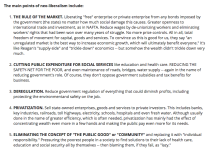poster
Senior Member
Over the past few years, I've done quite a bit of reading on what Neoliberalism is and its consequences. This piece, in which Chris Hedges and David Harvey explore Neoliberalism, is among the better examinations I've come across. It ended up being a nice piece to sit and sip my coffee to in the quiet of my sitting room.
https://www.truthdig.com/articles/neoliberalisms-dark-path-to-fascism/
Some snippets:
As a bit of an aside; I've noticed since the midterm elections that in some corporate media articles I've read, that many of the Democrats who are in fact neoliberals are being referred to as "progressives". It's an interesting sleight of hand. Case in point is this piece from Policico where the caption below the top photo of Rep Adam Smith (D-Wash) reads "Rep. Adam Smith (D-Wash.) who is set to become the first progressive in decades to run the House Armed Services Committee." When Smith is not, in the slightest, a progressive in the traditional sense of the word.
https://www.truthdig.com/articles/neoliberalisms-dark-path-to-fascism/
Some snippets:
Neoliberalism as economic theory was always an absurdity. It had as much validity as past ruling ideologies such as the divine right of kings and fascism’s belief in the Übermensch. None of its vaunted promises were even remotely possible. Concentrating wealth in the hands of a global oligarchic elite—eight families now hold as much wealth as 50 percent of the world’s population—while demolishing government controls and regulations always creates massive income inequality and monopoly power, fuels political extremism and destroys democracy. You do not need to slog through the 577 pages of Thomas Piketty’s “Capital in the Twenty-First Century” to figure this out. But economic rationality was never the point. The point was the restoration of class power.
[...]
“As a political project, it was very savvy,” he said. “It got a great deal of popular consent because it was talking about individual liberty and freedom, freedom of choice. When they talked about freedom, it was freedom of the market. The neoliberal project said to the ’68 generation, ‘OK, you want liberty and freedom? That’s what the student movement was about. We’re going to give it to you, but it’s going to be freedom of the market. The other thing you’re after is social justice—forget it. So, we’ll give you individual liberty, but you forget the social justice. Don’t organize.’ The attempt was to dismantle those institutions, which were those collective institutions of the working class, particularly the unions and bit by bit those political parties that stood for some sort of concern for the well-being of the masses.”
“The great thing about freedom of the market is it appears to be egalitarian, but there is nothing more unequal than the equal treatment of unequals,” Harvey went on. “It promises equality of treatment, but if you’re extremely rich, it means you can get richer. If you’re very poor, you’re more likely to get poorer. What Marx showed brilliantly in volume one of ‘Capital’ is that freedom of the market produces greater and greater levels of social inequality.”
[...[
Neoliberalism transforms freedom for the many into freedom for the few. Its logical result is neofascism. Neofascism abolishes civil liberties in the name of national security and brands whole groups as traitors and enemies of the people. It is the militarized instrument used by the ruling elites to maintain control, divide and tear apart the society and further accelerate pillage and social inequality. The ruling ideology, no longer credible, is replaced with the jackboot.
As a bit of an aside; I've noticed since the midterm elections that in some corporate media articles I've read, that many of the Democrats who are in fact neoliberals are being referred to as "progressives". It's an interesting sleight of hand. Case in point is this piece from Policico where the caption below the top photo of Rep Adam Smith (D-Wash) reads "Rep. Adam Smith (D-Wash.) who is set to become the first progressive in decades to run the House Armed Services Committee." When Smith is not, in the slightest, a progressive in the traditional sense of the word.
Last edited:

